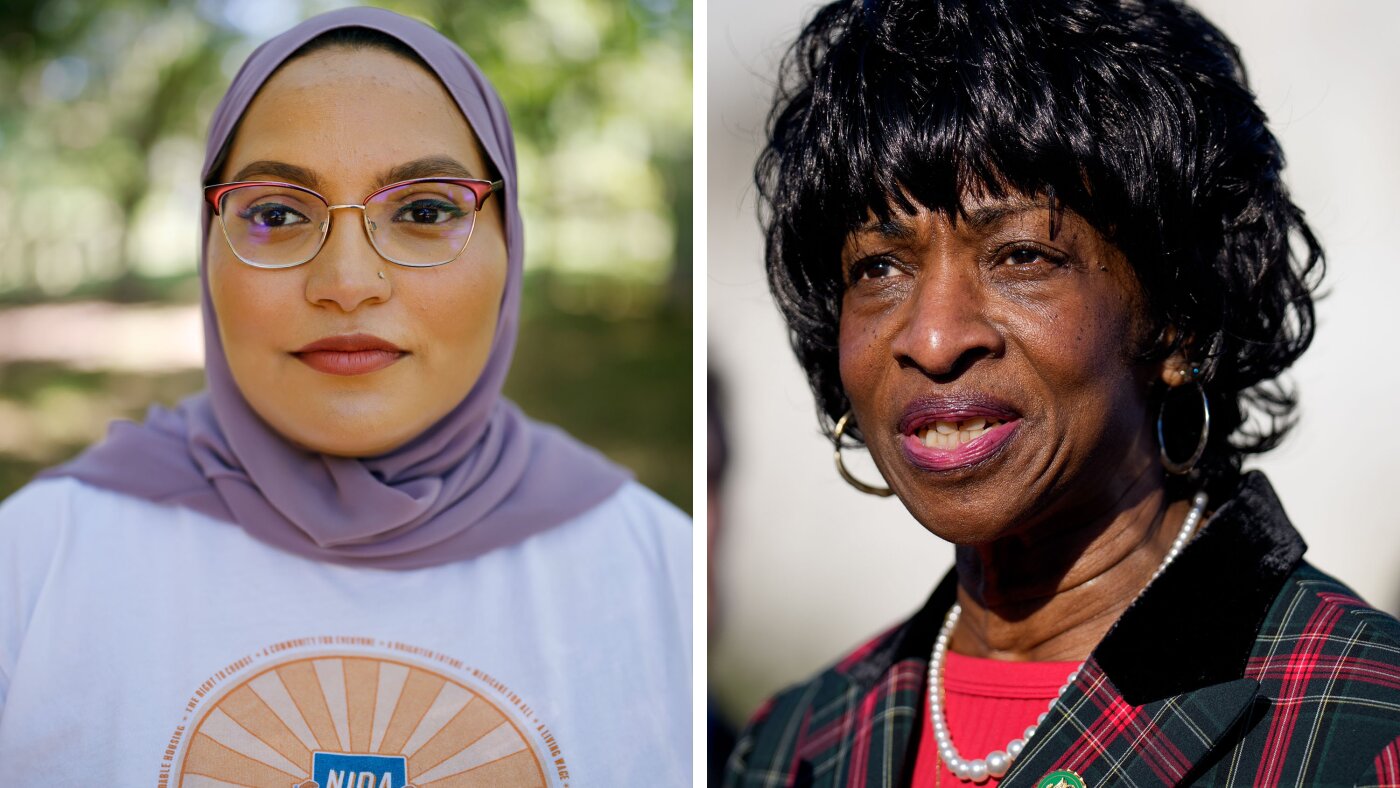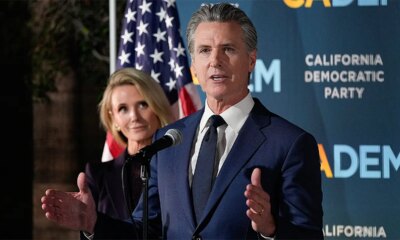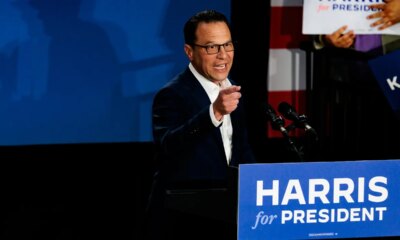North Carolina
Kamala Harris sparks excitement for Asian Americans in North Carolina • NC Newsline

Enthusiasm is growing among Asian Americans in North Carolina.
With Kamala Harris stepping into the race and the potential for the country’s first president of Asian American heritage, it’s ignited excitement in the community.
“I’ve already participated in a half dozen Zoom calls about ways members of the Asian American community can help and turn out the vote,” said Sen. Jay Chaudhuri, a Democrat representing portions of Wake County.
Harris marked many “firsts” when she became vice president after the 2020 election: she was the first woman, first Black person, and first Asian American in that position. Her father is Jamaican and her mother is Indian.
Now she has the opportunity to become the first Asian American presidential candidate if she secures the Democratic Party’s nomination.
“What people are excited about is recognizing the historical significance of it, that her lived experiences as an Asian American and Black woman really bring a different, inclusive level of representation to the highest level of government,” North Carolina Asian Americans Together communications director Jimmy Patel-Nguyen said.
The organization is focused on channeling that energy into voter outreach efforts, as well as raising awareness and education about key down ballot races.
The Asian American and Pacific Islander population in North Carolina has steadily increased in recent years.
It’s grown 63.3 percent since 2012 for a population size of about 456,655 in 2024, according to AAPIVote — a nonpartisan group dedicated to strengthening civic engagement for Asian American and Pacific Islander communities.
There are roughly 235,900 eligible Asian American and Pacific Islander voters in North Carolina, marking a 55.4 percent growth in voter eligibility from 2012 to 2022.
Asian Americans and Pacific Islanders make up 2.97 percent of the electorate in the swing state. In 2020, then-President Donald Trump narrowly won North Carolina by less than 75,000 votes.
“It’s really important for us to acknowledge that major campaigns cannot ignore us anymore,” Patel-Nguyen said. “We are too consequential to elections — every election, local, state, and federal, where we’re changing the political landscape in North Carolina.”
The population is concentrated around urban areas. Wake, Mecklenburg, Guilford, Durham, and Orange counties have the highest proportions of Asian Americans and Pacific Islanders.
Nearly 60 percent of Asian American adults in North Carolina speak a language other than English at home, according to AAPIVote.
Along with low voter contact, language barriers have accounted for low voter turnout for Asian Americans.
“We do see the gaps when it comes to language access and communication,” Rep. Maria Cervania, a Democrat representing portions of Wake County, said. “We know that we need to continue that and more so now.”
That’s why groups like NCAAT work to make voting as accessible as possible. In the past, NCAAT has translated mailers into different languages and made an effort to reach out to voters in their native tongue.
Another issue is avoiding treating the Asian American community as a monolith. With so many different backgrounds and cultures, there’s a wide variety of views across the political spectrum.
“A majority of AAPI voters in North Carolina are registered unaffiliated,” Patel-Nguyen said. “We’re really independent thinkers who are voting on issues and not all party lines.”
Top issues vary for individual voters, but there are general themes.
Younger voters prioritize lowering the cost of living, protecting abortion access and reproductive rights, and making healthcare more affordable, according to a poll by NCAAT. Older voters are more concerned about crime and public safety, as well as the economy and job creation.
The Harris campaign has invested more money into more media than ever in order to reach Asian American voters, according to the campaign.
“In just the first week since Vice President Harris became the presumptive nominee of our party, we’ve seen a groundswell of support from AANHPI voters across North Carolina who are fired up to elect Kamala Harris as the first Asian American president in U.S. history,” according to Natalie Murdock, the campaign’s North Carolina political and coalitions director.

North Carolina
2026 primary turnout report released for eastern NC counties; see your county’s numbers

Here are the voter turnout numbers for the 2026 primary election, according to the North Carolina State Board of Elections.
Hyde County had the highest voter turnout, while Onslow County had the lowest turnout. Check out what the voter turnout in your county was below:
BERTIE COUNTY
Ballots Cast:
31.85% (3,911 out of 12,280)
CARTERET COUNTY
Ballots Cast:
29.06% (16,543 out of 56,931)
CRAVEN COUNTY
Ballots Cast:
18.63% (14,119 out of 75,778)
DUPLIN COUNTY
Ballots Cast:
21.93% (6,981 out of 31,832)
EDGECOMBE COUNTY
Ballots Cast:
18.16% (6,428 out of 35,396)
GREENE COUNTY
Ballots Cast:
19.70% (2,147 out of 10,900)
HYDE COUNTY
Ballots Cast:
37.27% (1,123 out of 3,013)
JONES COUNTY
Ballots Cast:
25.91% (1,805 out of 6,966)
LENOIR COUNTY
Ballots Cast:
16.73% (6,251 out of 37,371)
MARTIN COUNTY
Ballots Cast:
17.61% (2,858 out of 16,228)
ONSLOW COUNTY
Ballots Cast:
11.44% (14,816 out of 129,537)
PAMLICO COUNTY
Ballots Cast:
24.03% (2,446 out of 10,180)
PITT COUNTY
Ballots Cast:
15.71% (19,429 out of 123,705)
TYRRELL COUNTY
Ballots Cast:
30.49% (723 out of 2,371)
WASHINGTON COUNTY
Ballots Cast:
28.66% (2,312 out of 8,067)
WAYNE COUNTY
Ballots Cast:
21.49% (16,408 out of 76,358)
North Carolina
Statewide tornado drill has NC schools and workplaces practicing safety

Wednesday, March 4, 2026 6:41PM
RALEIGH, N.C. (WTVD) — North Carolina schools and businesses took part in a statewide tornado drill Wednesday morning as part of Severe Weather Awareness Week.
The National Weather Service led the drill at 9:30 a.m., broadcasting it on NOAA Weather Radio and the Emergency Alert System. Schools, workplaces and households across the state were encouraged to join in.
The National Weather Service didn’t issue a follow up alert to mark the end of the drill. Instead, each school or business wrapped up once they felt they had practiced the procedures thoroughly.
Wednesday’s drill also replaced the regular weekly NOAA Weather Radio test.
SEE | New warning for parents amid new ‘fire-breathing’ social media trend
Make sure to download the ABC 11 Mobile App ABC11 North Carolina Apps for Connected TV, Mobile News, Echo
Copyright © 2026 WTVD-TV. All Rights Reserved.
North Carolina
North Carolina Rep. Valerie Foushee holds narrow lead over challenger Nida Allam

Nida Allam in 2022; Rep. Valerie Foushee (D-NC) in 2025.
Jonathan Drake/Reuters; Andrew Harnik/Getty Images
hide caption
toggle caption
Jonathan Drake/Reuters; Andrew Harnik/Getty Images
Incumbent Rep. Valerie Foushee holds a narrow lead over challenger Nida Allam in the Democratic primary for North Carolina’s 4th Congressional district as ballots continue to be counted.
In a race seen as an early test of whether Democratic voters desire generational change within the party, Foushee holds a lead of just over 1,000 votes with 99% of results in so far, according to the Associated Press.
Under state law, provisional votes will be counted in the coming days in a district that includes Durham and Chapel Hill. If the election results end up within a 1% margin, Allam could request a recount.
Successfully ousting an incumbent lawmaker is often extremely difficult and rare. However, there have been recent upsets in races as some voters are calling for new leaders and several sitting members of Congress face primary challengers this cycle.
Allam, a 32-year-old Durham County Commissioner, is running to the left of Foushee, 69, framing her candidacy as part of a broader rejection of longtime Democratic norms.
On the campaign trail, Allam ran on an anti-establishment message, pledging to be a stronger fighter than Foushee in Congress, both in standing up against President Trump’s agenda and when pushing for more ambitious policy.
“North Carolina is a purple state that often gets labeled red, but we’re not a red state,” she told NPR in an interview last month, emphasizing the need to address affordability concerns. “We are a state of working-class folks who just want their elected officials to champion the issues that are impacting them.”
She drew a contrast with the congresswoman on immigration, voicing support for abolishing U.S. Immigration and Customs Enforcement. Foushee has declined to go that far, advocating instead for ICE to be defunded and for broader reforms to the federal immigration system.
Allam also clashed with Foushee over U.S. policy towards Israel. As a vocal opponent of Israel’s war in Gaza, Allam swore off campaign donations from pro-Israel lobbying groups, such as AIPAC, and repeatedly criticized Foushee for previously accepting such funds.
Though Foushee announced last year that she would not accept AIPAC donations this cycle, she and Allam continued to spar over the broader role of outside spending in the race.
Their matchup comes four years after the candidates first squared off in 2022, when Allam lost to Foushee in what became the most expensive primary in the state’s history, with outside groups spending more than $3.8 million.
However, this year is poised to break that record. Outside groups have reported spending more than $4.4 million on the primary matchup, according to Federal Election Commission filings.
WUNC’s Colin Campbell contributed to this report.
-

 World1 week ago
World1 week agoExclusive: DeepSeek withholds latest AI model from US chipmakers including Nvidia, sources say
-

 Massachusetts1 week ago
Massachusetts1 week agoMother and daughter injured in Taunton house explosion
-

 Wisconsin4 days ago
Wisconsin4 days agoSetting sail on iceboats across a frozen lake in Wisconsin
-

 Maryland5 days ago
Maryland5 days agoAM showers Sunday in Maryland
-

 Florida4 days ago
Florida4 days agoFlorida man rescued after being stuck in shoulder-deep mud for days
-

 Denver, CO1 week ago
Denver, CO1 week ago10 acres charred, 5 injured in Thornton grass fire, evacuation orders lifted
-

 Massachusetts3 days ago
Massachusetts3 days agoMassachusetts man awaits word from family in Iran after attacks
-

 Oregon6 days ago
Oregon6 days ago2026 OSAA Oregon Wrestling State Championship Results And Brackets – FloWrestling

























